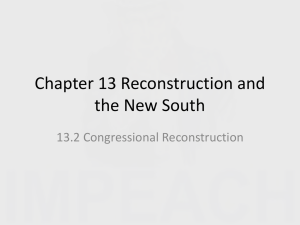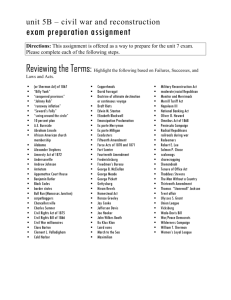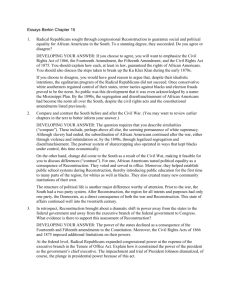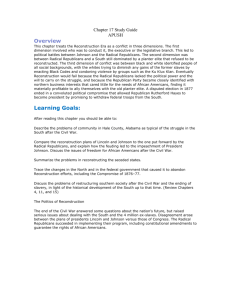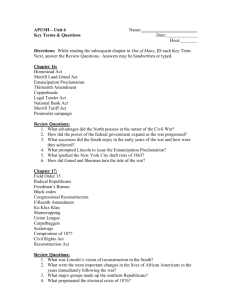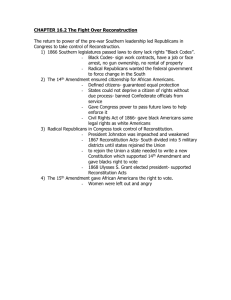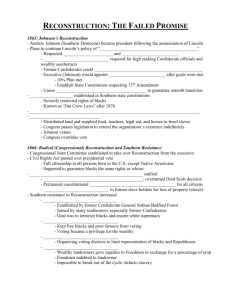Post-War Reconstruction
advertisement
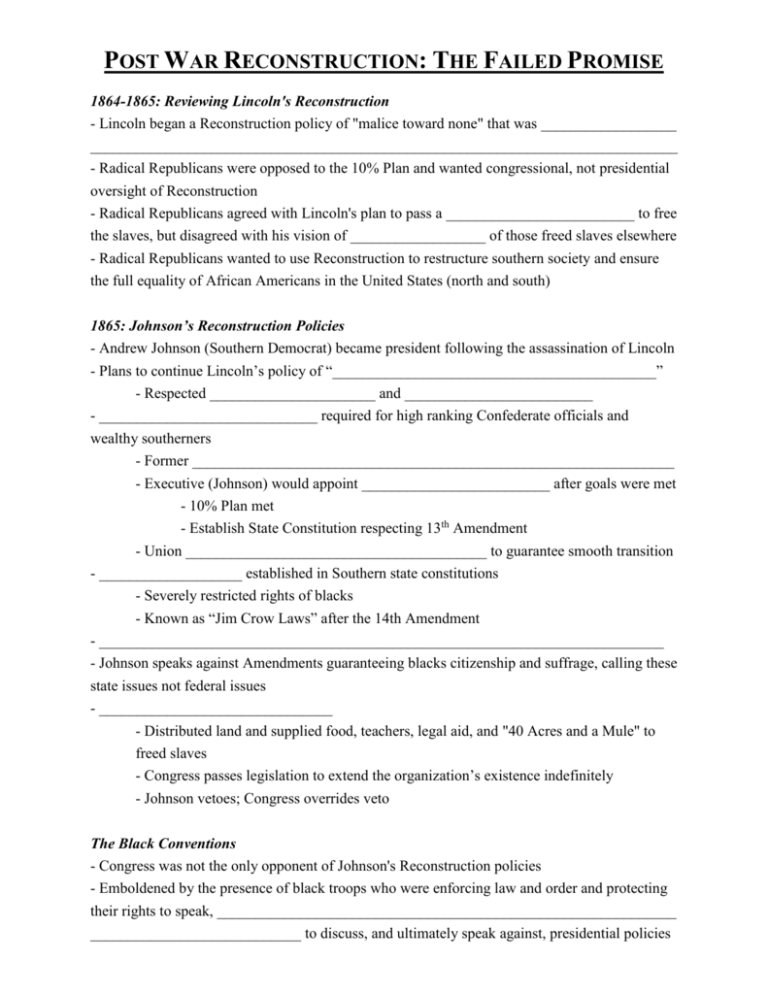
POST WAR RECONSTRUCTION: THE FAILED PROMISE 1864-1865: Reviewing Lincoln's Reconstruction - Lincoln began a Reconstruction policy of "malice toward none" that was __________________ ______________________________________________________________________________ - Radical Republicans were opposed to the 10% Plan and wanted congressional, not presidential oversight of Reconstruction - Radical Republicans agreed with Lincoln's plan to pass a _________________________ to free the slaves, but disagreed with his vision of __________________ of those freed slaves elsewhere - Radical Republicans wanted to use Reconstruction to restructure southern society and ensure the full equality of African Americans in the United States (north and south) 1865: Johnson’s Reconstruction Policies - Andrew Johnson (Southern Democrat) became president following the assassination of Lincoln - Plans to continue Lincoln’s policy of “___________________________________________” - Respected ______________________ and _________________________ - _____________________________ required for high ranking Confederate officials and wealthy southerners - Former ________________________________________________________________ - Executive (Johnson) would appoint _________________________ after goals were met - 10% Plan met - Establish State Constitution respecting 13th Amendment - Union ________________________________________ to guarantee smooth transition - ___________________ established in Southern state constitutions - Severely restricted rights of blacks - Known as “Jim Crow Laws” after the 14th Amendment - ___________________________________________________________________________ - Johnson speaks against Amendments guaranteeing blacks citizenship and suffrage, calling these state issues not federal issues - _______________________________ - Distributed land and supplied food, teachers, legal aid, and "40 Acres and a Mule" to freed slaves - Congress passes legislation to extend the organization’s existence indefinitely - Johnson vetoes; Congress overrides veto The Black Conventions - Congress was not the only opponent of Johnson's Reconstruction policies - Emboldened by the presence of black troops who were enforcing law and order and protecting their rights to speak, _____________________________________________________________ ____________________________ to discuss, and ultimately speak against, presidential policies - Conventions proclaimed the motto "______________________________________________" - Delegates demanded all the same rights as whites - Delegates demanded a repeal of Black Codes - Black political mobilization advanced fastest in places where federal troops stayed the longest - Leadership usually came from the free black elites from before the Civil War, but not always 1866: Radical (Congressional) Reconstruction Begins and Southern Resistance Deepens - Congressional Joint Committee established to take over Reconstruction from the executive - Civil Rights Act passed over presidential veto - Full citizenship to all persons born in the U.S. except Native Americans - Supposed to guarantee blacks the same rights as whites - __________________________________________________ ratified - ____________________________________________; overturned Dred Scott decision - Permanent constitutional ______________________________________ for all citizens - _____________________________ to former slave holders for loss of property (slaves) - Southern resistance to Reconstruction increased - _________________________________ - Established by former Confederate General Nathan Bedford Forest - Joined by many southerners, especially former Confederates - Goal was to terrorize blacks and ensure white supremacy - _________________________________ - Kept free blacks and poor farmers from voting - Voting became a privilege for the wealthy - _________________________________ - Organizing voting districts to limit representation of blacks and Republicans - _________________________________ - Wealthy landowners gave supplies to Freedmen in exchange for a percentage of crop - Freedmen indebted to landowner - Impossible to break out of the cycle: defacto slavery 1867: The Radical Republicans Formalize Control - ____________________________________ - ________________________ held advantage in Congress - Senate: 42 Republicans, 11 Democrats - House: 143 Republicans, 49 Democrats - Could ___________________________________ (requires a 2/3 majority of Congress) - _________________________________________________ - South divided into ___________________________ (except TN which had ratified the 14th and was readmitted) - New qualifications for reentry of states established - New Constitutional Convention had to be called; no ex-Confederates allowed - Had to approve the 14th Amendment - No ex-Confederates could vote without a Congressional pardon - Johnson Impeachment (1st Attempt) - Fall 1867 - House Judiciary Committee brought a bill of impeachment against Johnson - Charges were not legal arguments so much as they were a list of complaints - Vote for trial failed: 108-57 - _____________________________________________ - ______________________________________________________________________ - Johnson decided to test the act by firing ______________________________________ 1868: The Johnson Impeachment - Stanton refused to leave after being dismissed by Johnson - Congress claimed Johnson violated the Tenure of Office Act - Johnson Impeachment (2nd Attempt) - House brought charges of impeachment for ___________________________________ - ____________ whether it was an impeachable offence and if the law was Constitutional - Johnson may not have technically violated the act as Stanton was a Lincoln appointment - Wording of the _________________________________________ on that point - 1926 the Supreme Court ruled the Tenure of Office Act was not Constitutional - ________________________________________ held in Senate - Each time, vote was the same - 35 voted Guilty; 19 voted Not Guilty - ________________________________________________________________ - Guilty verdict would have set a ______________________________: removal of president for political differences not “high crimes or misdemeanors” 1869- 1876: The Presidency of Ulysses S. Grant - General Ulysses S. Grant (Republican) elected president (1869-1877) - Administration filled with ______________________, especially among his appointees - Grant ______________________________, even after their guilt was firmly established - Grant apparently _______________________________ from the corruption 1870: Protecting New Citizens - ____________________________: right to vote guaranteed to all citizens - ____________________________: violators of 14th and 15th Amendments could be prosecuted - ________________________________________ - Federal government could use troops to protect citizens from terror - Began the downfall of the KKK African Americans in Government - New National Officials - ____________________ was the first African American Senator elected in U.S. history when he was elected to take the seat formerly occupied by Jefferson Davis in 1870 - _____________________________, elected in 1874 and also from Mississippi, was the last full term African American Senator until Edward Brooke was elected in 1866 - _____________________________________ of Representatives during Reconstruction - Most of the blacks in Congress had __________________________________________ at state constitutional conventions, as state senators and representatives, or as state and local officials - Many of the new officials had moved from the north to the south during Reconstruction - Their primary focus was on legislation to protect _______________________________ - New State Officials - ______________________________________________________________________ _________________ during Reconstruction because many whites were not reconstructed - Several hundred African Americans served in state legislatures during Reconstruction - ________________________________________ from the north during Reconstruction - ____________________________________________________________________________ ______________________________________________________________________________ 1871: The End Of The KKK (for now) - _________________________________________________________ - Lynchers were rarely prosecuted - Prosecutions often failed: ______________________________ - Made it ____________________________________________ - Gave control of lynching trials to the federal government - ________________________________________________________ - Allowed for _____________________________ within federal courts - KKK disappeared until around 1915 1875: Violent Reactions - ____________________________________________ - Widespread terror against - ____________________ - ____________________ (Northern Republicans who went South to work) - ____________________ (Southern Republicans who supported Reconstruction) - Democrats visited Republican political rallies and __________________________ - During riots, “________________” gunned down innocents and political leaders - Turned an 1874 election Republican majority of 30,000 to a Democratic majority of about the same number in 1875 - President ____________________________________; feared being accused of “bayonet rule” - ____________________________________________________________________________ 1876: Support for Reconstruction Weakens - Throughout the period of Reconstruction northern Republican governments had become increasingly _________________, often beholden to powerful ___________________________ - The deaths of Charles __________________ (1874) and Thaddeus _________________ (1868) further weakened the Radical Republicans; many less committed Republicans began to waiver in their support for Reconstruction as they became increasingly focused on economic issues - Supreme Court decisions also hastened the end of Reconstruction - In ___________________________________ the court ruled that the 15th Amendment did not guarantee suffrage to everyone, it only prevented preference being given based on race, color, or previous condition of servitude, opening the door to poll taxes, literacy tests, and grandfather clauses - In ___________________________________ the court ruled the Enforcement Act unconstitutional on the basis that the guarantees of due process and equal protection in the 14th Amendment only applied to state-imposed actions, not those taken by individuals 1877: The End of Reconstruction - Election of 1876 - _____________________________________________________________ - Hayes (Northerner) lost the popular election to Tilden (Southerner) - With 20 electoral votes still to count, __________________________________ - _________________________________________________ (Mississippi Plan) - All votes initially given to Hayes, but later all votes were tossed out - _________________ was formed to decide: 8 Republicans, 7 Democrats - ____________________________________________________________________________ - ______________________________________ but would not run for reelection - ________________________________________________________________ - ________________________________________________________________

